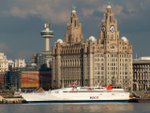This article is taken from society guardian on-line.
ALTHOUGH Blair McPherson is from Lancashire Council, he speaks as a general idea based on his experiences in Lancashire.
all thoughts on the article itself is from a capital view front, however it strikes a cord given Liverpool is actually CAPITAL of CULTURE!
Support your local carers, demand that they and the vulnerable people of the City do not suffer even more, just to fund the CAPITAL in the CULTURE events of 2008.
Capital in culture
Councils must take seriously the social and economic value of the arts when weighing up their spending priorities, writes Blair McPherson
Tuesday June 26, 2007
SocietyGuardian.co.uk
 Blair McPherson: 'Culture is a fundamental ingredient in making for a better place to live' |
It's a no-brainer: services to vulnerable people come before culture. Or is there a case for cultural services being fundamental to delivering the big agendas of regeneration, community cohesion, social inclusion and wellbeing?
The significance of culture for local authorities is best understood by describing the range of services provided by local authorities that fall within the Department of Culture, Media and Sport's remit. In Lancashire, these services include libraries, museums, arts and archives.
Cultural services are not about aesthetics and taste but about the way communities describe and express themselves, how they portray themselves and about their sense of identity.
Community art can be used to help give a place an identity and a positive image by building on a place's heritage. Art projects can be used to harness the creativity of a community and to express loss, anger, celebration and aspiration in the face of economic and environmental change.
The outpouring of creative energy that was harnessed to help coal and shipbuilding industries adjust to loss and change was invaluable. Art, drama and music traditionally have been ways of rebelling and expressing dissent in a way that petitions, reports, and letters can never capture. Performing arts can provide an awareness-raising experience and connect with sections of the community that are often described as hard to reach.
An example of this nationally is the group of elderly people who have got together with a record producer to release a version of The Who's My Generation, drawing attention to the poor quality of life endured by many older people in society today.
Lancashire has its own sinfonietta, comprised of some of the country's finest musicians. Linked with the Sure Start programme in Lancashire, the sinfonietta puts on baby-friendly concerts. Classical musicians play Mozart live to young children from disadvantaged backgrounds.
Cultural events such as music festivals can engage the young or showcase minority ethnic cultures through Caribbean carnivals or Asian melas. Art exhibitions can record a place's past or reflect present diversity. Plays in schools, films made by community groups and radio adverts designed by young people can engage a wider audience in addressing juvenile crime; bullying, binge drinking, graffiti and littering. In this way drama, music and art can bridge the generation gap and bring together sections of the community that might otherwise have no contact.
Libraries can provide venues for creative social activity, especially for the old and the very young. Libraries also provide access to computers to people who otherwise may not have access to email and the internet.
Museums provide the deep mines of heritage from which many communities extract their ideas about their past. In Burnley and the surrounding area, the terraced housing, canal-side warehouses and the large Asian population are all a direct result of the cotton industry. Well-preserved cotton mills that capture the noise, heat and risk to health and safety are not just interesting school history trip destinations, they are how your grandparents made a living and they explain why Burnley is different from other parts of Lancashire.
The economic benefit of a vigorous cultural services policy can equally match the social benefits. Cultural services - museums, arts and archives - attract visitors as part of tourism. It is estimated, for example, that for every £1 spent by Bolton council on its museums, an additional 60p is generated through the economic/tourism multiplier.
Arts development, including theatre, sculpture and crafts, also provides and supports an environment in which creative industries can thrive and support employment. In Lancashire it is estimated that each £1 spent on arts development generates an additional £5 from outside agencies, which in turn generates an economic multiplier.
Cultural services can influence a place's image and have a positive impact on people's view of where they live. An active cultural landscape is an indicator of whether a community is forward-looking, self-respecting and inspirational. These factors can be as important to the local economy as access to good road and rail links and a skilled workforce.
Investing in culture and investing in an area's cultural infrastructure requires local authorities to see the links between culture, regeneration, community cohesion, social inclusion and wellbeing. It requires recognition that, far from being the icing on the cake, culture is a fundamental ingredient in making for a better place to live, work, visit and invest in. In my experience it is not the local politicians who need convincing of this but my fellow local government officers.
· Blair McPherson is director of community services for Lancashire county council.













































No comments:
Post a Comment